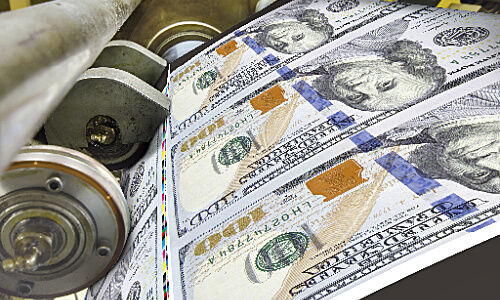The liquidity injected into markets by central banks led to a surge on equity markets since the outbreak of the pandemic. The printing presses will continue to run hot with the economy returning from the deepest recession in many decades. The Swiss National Bank won't likely step out of line next week.
The times are not for more undue excitment. Christine Lagarde, the president of the European Central Bank (ECB), a week ago kept a steady course, and her colleagues at the Swiss National Bank (SNB) won't likely divert from the tried and tested tactic next week. The quarterly review of monetary policy is set to be an event that will spring few surprises.
And yet, the Swiss central bank's outlook is of great interest. The current economic development seems to conform pretty well with what the SNB predicted in June, but it will be interesting to see how the three policymakers assess the progress and how they forecast the future course.
Rate of Recovery Is Slowing
The Swiss big bank Credit Suisse for instance had from early on stood out with an optimistic forecast for economic recovery and its outlook seems to have stood the reality check. This week, the economic department of the bank said that there was a pretty rapid recovery underway in the country of 8.5 million, but that the rate of recovery would become rather sluggish over time, with the curve of gross domestic product thus resembling a «lopsided V». GDP would only recover to the level it had at the end of 2019 by the end of 2021.
When the SNB on June 18 last considered its monetary policy, it based the scenario of the future economic development on a pandemic curve that today seems outdated: «In its baseline scenario for the global economy, the SNB anticipates that further waves of infection will be successfully prevented.»
From today's perspective, such a development already looks out of reach even if it is not clear what the further waves of infection currently underway will mean in terms of lockdown measures.
Activity on the Exchange Front
The situation on forex markets has seen two trends that went opposite ways in recent months. The euro, which is a key component for the Swiss export-oriented economy, has recovered significantly from its low in spring, when it had dropped below the important threshold of 1.05 francs per euro. Today it is trading at about 1.075.
This will have helped the export industry and as such is easing pressure on the SNB to buy more euros in big quantities to weaken the franc.
The steady ship policy of the ECB will probably also play into the hands of the SNB. As long as the euro remains on an upward trajectory, the bank has no particular reason to change its monetary policy. Last time that the SNB changed tack, in 2015, it did so because the abandonement of the euro-peg had prompted a massive appreciation of the franc. Such a shift isn't on the cards.
Dollar Weakness Offsets Euro Appreciation
But while the euro for once is not the source of major concern for monetary policy makers, the dollar rate is. The U.S. currency has fallen back to a level of about 90 centimes to the dollar, having been stable at or around parity for two years. Hence, while Swiss goods in Europe have become cheaper, U.S. buyers are forced to pay more for everything from Swiss chocolate to watches and high-precision toolmaking machines.
The dollar may have risen slightly since the recent Fed meeting and ensuing media conference, but the signs nevertheless are for a longer period of a weak dollar. Fed-Chief Jerome Powell surprised markets with his announcement that rates would remain close to zero until at least 2023 to give the labor market the necessary boost and to stimulate inflation.
They Can Only Do That Much
The announcement by Powell was seen as an attempt to give the U.S. economy the necessary impetus to regain lost ground. Low rates as such are seen as an act of support for the ailing economy and key to get growth and the labor market going again.
Back in Switzerland, the SNB has for some time prioritized the exchange rate with its monetary policy. Going even lower with interest rates hence makes little sense at a time when the euro tends to appreciate. And a small rate cut wouldn't actually do much to help the economy recover any faster.
Shortly after governments across the world imposed far-reaching measures to contain the pandemic in March, the chief economist of EFG Bank in Zurich, Stefan Gerlach, told finews.com that central banks might create a favorable condition for the economy, but that they would eventually take backstage, because the economy was facing a rapid descent due to the lockdown and the ensuing shock to demand. Those words still ring true in many ways.































